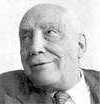Salama Moussa
Salama Moussa (or Musa; 1887 – 4 August 1958) (Arabic: سلامه موسى pronounced [sæˈlæːmæ ˈmuːsæ], Coptic: ⲥⲁⲗⲁⲙⲁ ⲙⲱⲩⲥⲏⲥ) was a notable Egyptian journalist and reformer in the 1920s. He was born in Zagazig. His family was Coptic Christian. Moussa was interested in many areas of science and culture. He strongly believed that human intelligence could create progress and a better life. In 1908, he travelled to Europe and studied literature, philosophy, social and natural sciences. He continued studying these subjects throughout his life.
Salama Moussa | |
|---|---|
 | |
| Born | 1887 Zagazig, Egypt |
| Died | 4 August 1958 (aged 70–71) Cairo, Egypt |
| Occupation | Journalist |
| Nationality | Egypt |
| Notable works | Man at the Top of Evolution |
Language
changeMoussa belonged to a group of intellectuals who wanted to simplify Arabic and its grammar. They wanted Egyptian Arabic to officially become the Modern Egyptian language. His conservative opponents became angry with him. Standard Arabic had not changed for generations. Most Egyptian people could not read or write that Standard Arabic. Therefore, Moussa and other thinkers said people should write in the common, local Arabic. People still discuss making language simpler and more modern in Egypt. Salama Moussa's writings continue to be popular.
Influence on other writers
changeSalama Moussa was a mentor of Naguib Mahfouz. Mahfouz was an Egyptian Nobel prize-winner in literature. Moussa told Mahfouz: "You have much talent, but your essays are no good." After that, Mahfouz chose his topics more carefully.
Salama Moussa became seriously ill and died on 4 August 1958.
Writing
change- Divine Thoughts and Their Origin (1912)
- Treatise about Socialism (1913)
- The Most Well-known Love Affairs in History (1925, revised and renamed "Love in History" around 1949)
- Reading Matters on Elections (1926)
- Dreams of a Philosopher (1926)
- Freedom of Thought and Its Representatives (1927)
- Secrets of the Inner Life (1927, revised in 1948)
- History of Art and the Most Well-known Pieces of Work (1927)
- Today and Tomorrow (1928)
- Descent and Development of Mankind (1928)
- Stories (1939)
- About Life and Culture (1930, revised and renamed in 1956: Culture and Life)
- Our Duties and the Tasks of Foreign Countries (1931)
- Gandhi and the Indian Revolution (1934)
- Renaissance in Europe (1935, in 1962 published after his death revised and renamed "What Is Renaissance")
- Egypt, a Place Where Civilization Began (1935, expanded edition in 1948)
- The World in 30 Years (1936)
- Modern English Culture (1936, expanded ed. in 1956)
- Our Life as from 50 (1944, expanded ed. in 1956)
- Freedom of Thought in Egypt (1945, this piece of work clearly shows, how much Salama Moussa was influenced by the European culture, in particular by Voltaire.)
- Eloquence and the Arabic Language (1945, expanded edition in 1953, also 1964)
- My and Your Intellect (1947, expanded edition 1953)
- The Years of Salama Moussa’s Apprenticeship (1947, expanded 3rd edition published after his death)
- The True Path of the Young People (1949)
- Psychological Attempts (1953, changed to Attempts in1963)
- These are My Mentors (1953, among them a very obstinate discussion on Goethe’s works, published after his death expanded ed. in 1965)
- The Book of Revolutions (1955)
- Psychological Studies (1956)
- The Woman Is not the Plaything of the Man (1956)
- George Bernhard Shaw (1957, expanded edition in 1977)
- Attempts of the Young People (published after his death, 1959)
- Forbidden writings (published after his death, 1959)
- Mankind is the Pride of Creation (published after his death,1961)